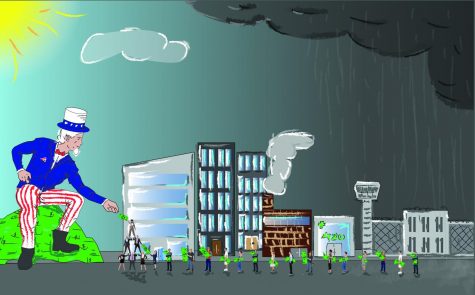Up in Smoke: Pot is Popular, But Still Illegal
As weed becomes trendy, what will we do with those in prison for possession or selling it?

What’s the difference between a cannabis dispensary and a weed dealer? One has to pay tax money and the other, bail money. America is participating in organized crime by violating its very own rules. The federal government still places marijuana in the same category as heroin and cocaine, but you wouldn’t know that unless you were living in a low-income neighborhood, getting arrested for it.
The War on Drugs has resulted in the arrest of millions of people, majority of which are people of color. American Civil Liberty Union (ACLU), a non-profit organization geared towards “defending and preserving the individual rights and liberties of every person,” reports that marijuana use is roughly as equal among African Americans and Caucasians, yet African Americans are 3.73 times more likely to be arrested for marijuana possession. Possessing the slightest amount of marijuana has had dire consequences and has affected people of color for decades including eligibility for student financial aid, employment opportunities, child custody litigation, and immigration status.
It appears that these disparities reflect a policy that at least goes as far back as the Nixon Administration. According to Dan Baum in his article titled “Legalize It All: How to Win the War on Drugs” published in Harper’s Magazine, John Ehrlichman told Baum in an interview the following:
“The Nixon campaign in 1968, and the Nixon White House after that, had two enemies: the antiwar left and black people. You understand what I’m saying? We knew we couldn’t make it illegal to be either against the war or black, but by getting the public to associate the hippies with marijuana and blacks with heroin, and then criminalizing both heavily, we could disrupt those communities. We could arrest their leaders, raid their homes, break up their meetings, and vilify them night after night on the evening news. Did we know we were lying about the drugs? Of course we did.”
Bernard Noble, an African American, who was sentenced to 13 years of hard labor for possessing two marijuana joints, was granted parole in February of 2018, after serving more than 8 years in a Louisiana prison. His sentence was unconstitutionally excessive, overlooking the fact that he was a middle-aged man who supported seven children, was gainfully employed for over twenty years and had no history of violence.
Meanwhile, Noble was working penal labor, also known as ‘slave’ labor, which is explicitly allowed under the 13th Amendment of the U.S. Constitution. Across the country, people living in states like Colorado and Washington were sparking up joints while simultaneously applying for LLCs.
Marijuana Business Daily conducted a survey and found that 81 percent of cannabis executives were white, mostly men, while 5.7 percent were Latinx and 4.3 African American. Those that have been most victimized by the War on Drugs, are being shut out of the booming green industry. Cory Booker, a New Jersey Democrat and presidential candidate told VICE News, “At this point it’s too obvious and urgent and unfair that we’re moving something on marijuana on the federal level and it doesn’t do something on restorative justice. I want a bill to have some acknowledgement of the savage injustices that the marijuana prohibition has done to communities.”
The City of Oakland introduced a groundbreaking Equity Permit Program, on May 23, 2017, that minimizes barriers to cannabis licensing for Oakland residents who have been most victimized by the war on drugs. Unfortunately, the high costs of setting up legal cannabis operations are holding people of color back while allowing big interest groups to control the industry.
The government collected an estimated $4.7 billion in taxes from legal cannabis companies last year on nearly $13 billion in revenue. However, under federal law, marijuana is illegal. Cannabis businesses in the United States still pay federal taxes and are not allowed any deductions or credits for business expenses. Proceeds from marijuana transactions are considered money laundering and banks refuse to hold such money because of the risks involved. These cannabis businesses pay their taxes in cash which in turn is creating havoc for employees working for the IRS.
In spite of all this, under the Controlled Substances Act, the Drug Enforcement Administration (DEA) still considers marijuana a Schedule 1 drug. If one is arrested and charged, they are sent to prison. The Federal government is simultaneously collecting billions of taxpayers’ dollars to incarcerate individuals who have been convicted of marijuana charges. According to the Legislative Analyst’s Office of California, it costs an average of about $81,000 per year to incarcerate an inmate in prison in California. The criminal justice system also imposes hefty fines on the inmate.
Many states are en route to the decriminalization and legalization of marijuana. As of January 2019, fourteen U.S. states have decriminalized marijuana, but have yet to make the drug legal for recreational use. Decriminalization laws vary from state to state. However, these laws do not ensure that possession of the drug will not be faced with legal penalties.
It appears that the federal government has no interest in legalizing marijuana. It circumvents its own laws, turning a blind eye to make a profit off of activities it deems illegal. The cannabis industry is booming, with an estimated trajectory of up to $50 billion in global sales by 2026. However, despite its recent glamorization, individuals, in not so trendy states, are still serving time behind bars for the same thing. All the while, Uncle Sam is funneling in monies, whether it’s from a ‘criminal’ or entrepreneur. This is the way organized crime has operated for years.
Afroditi Kontos can be reached at [email protected]
